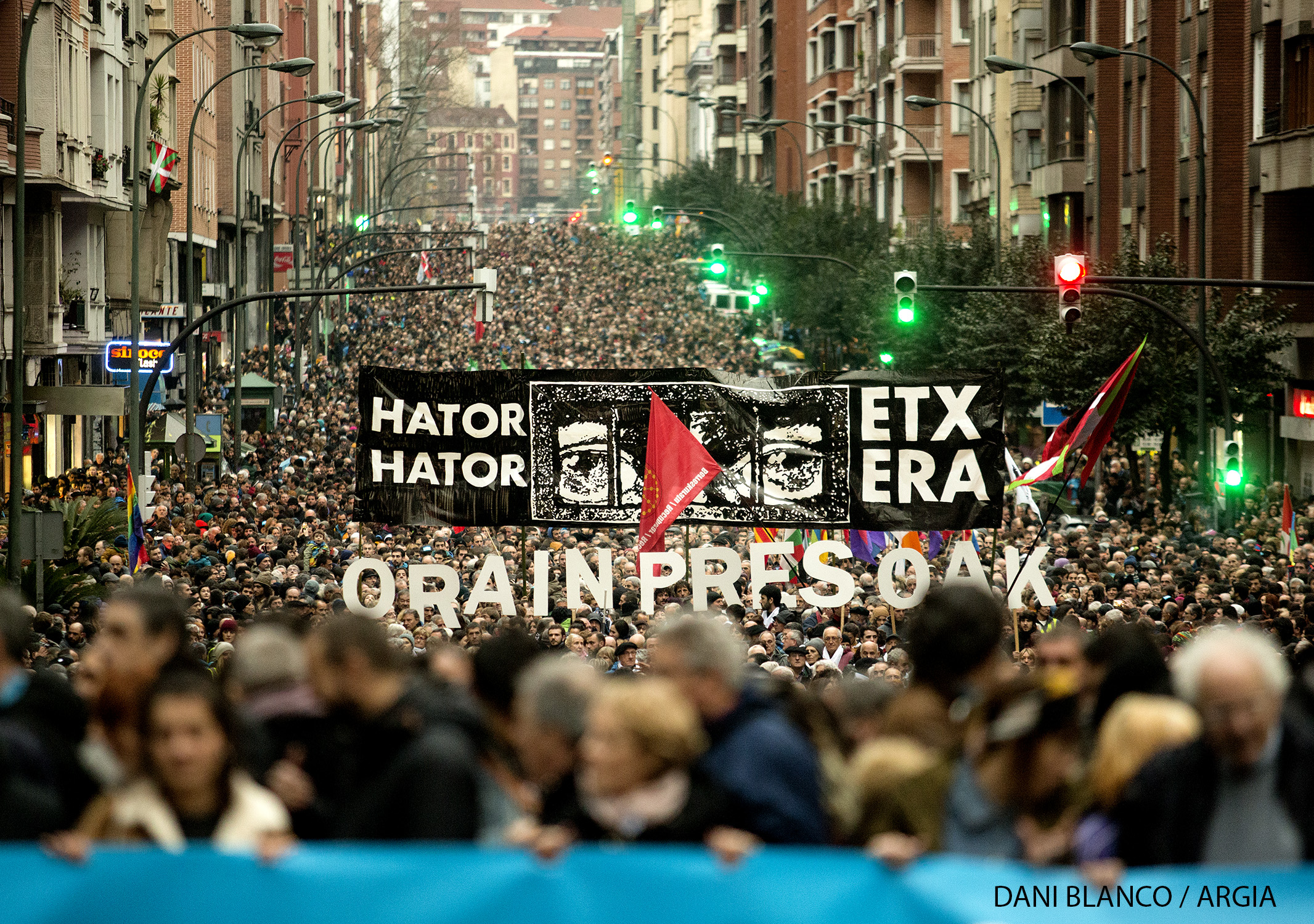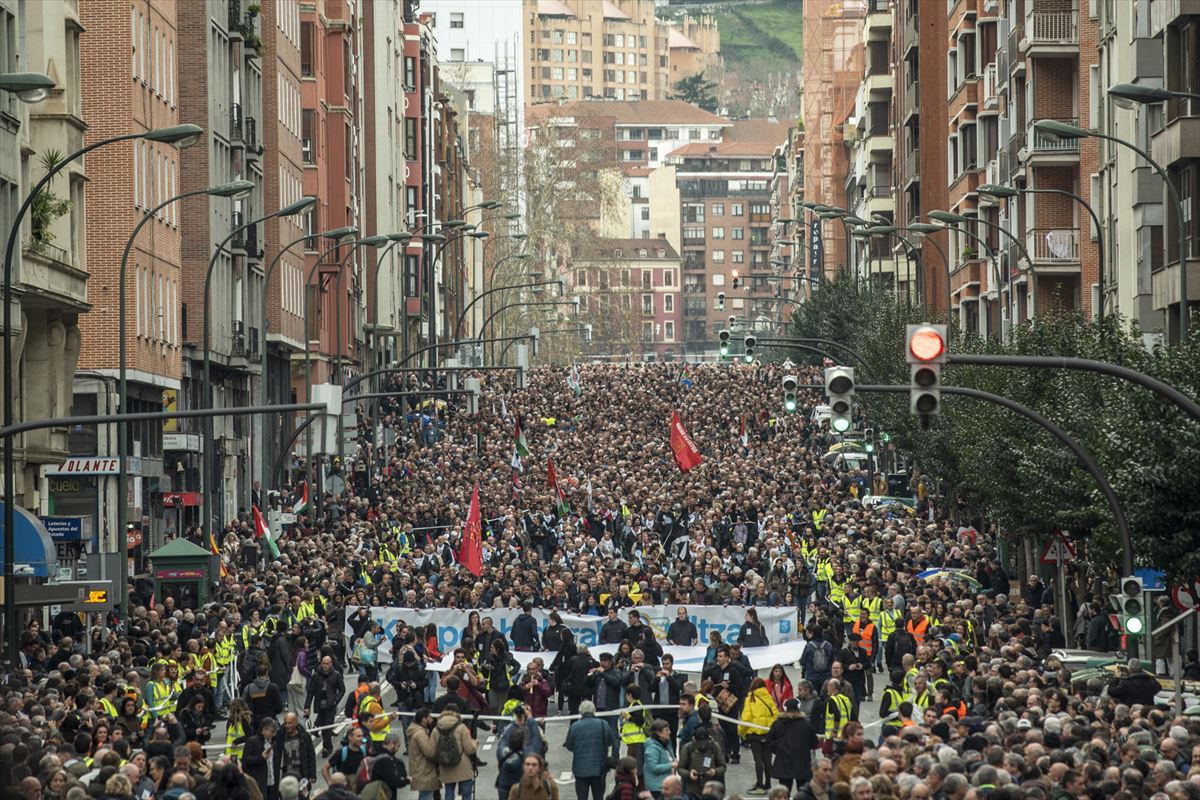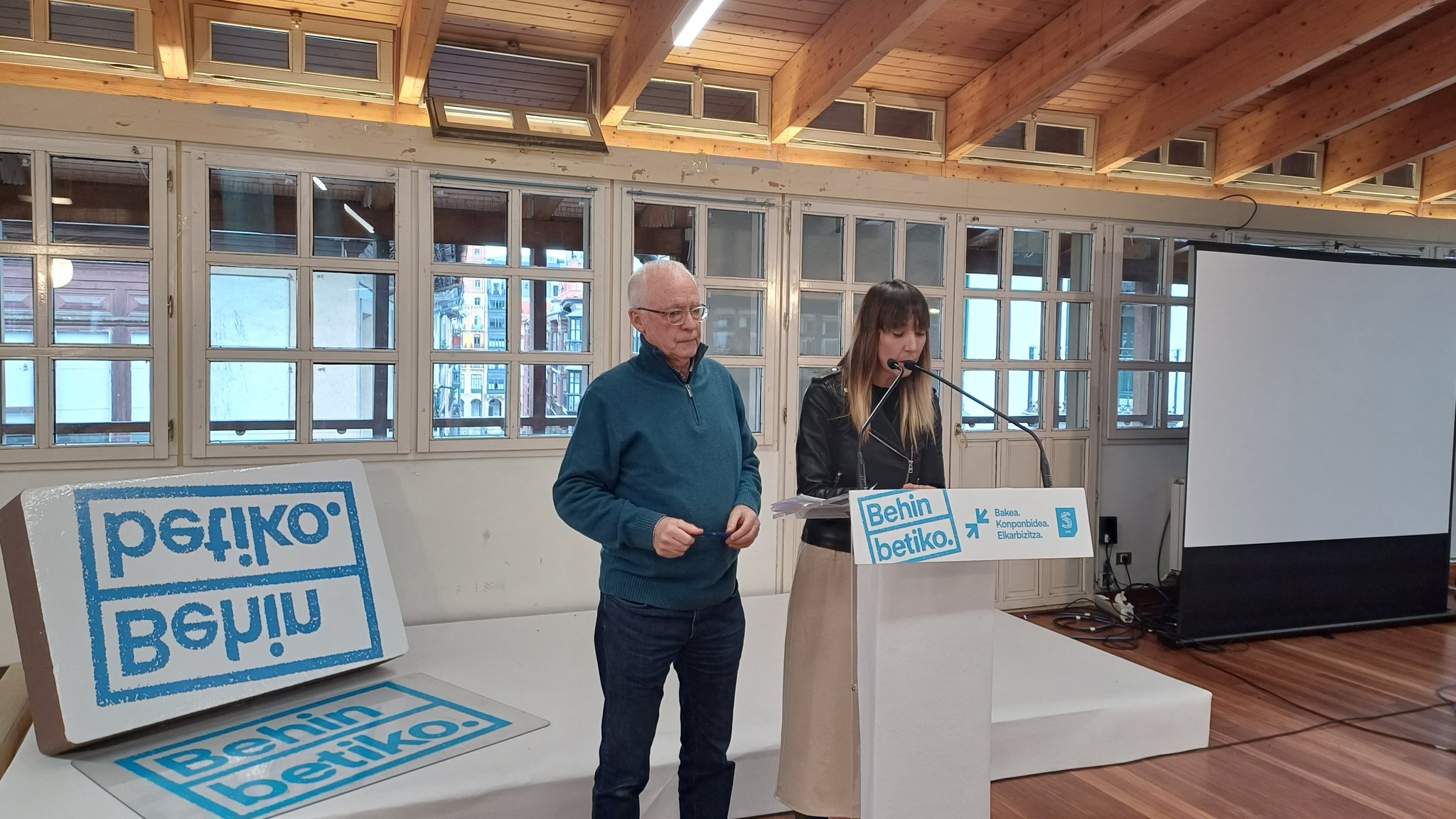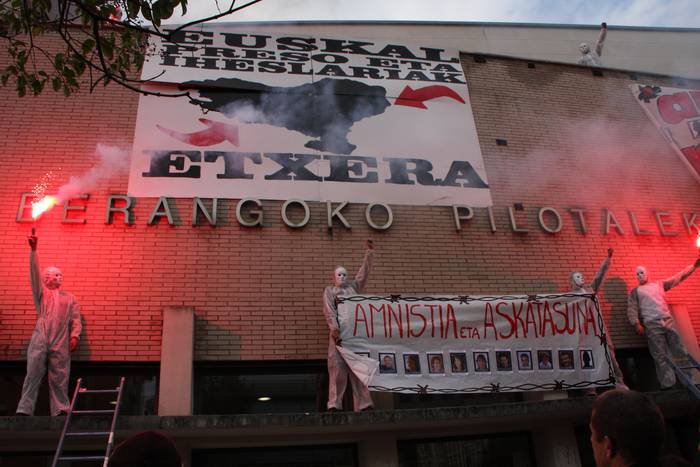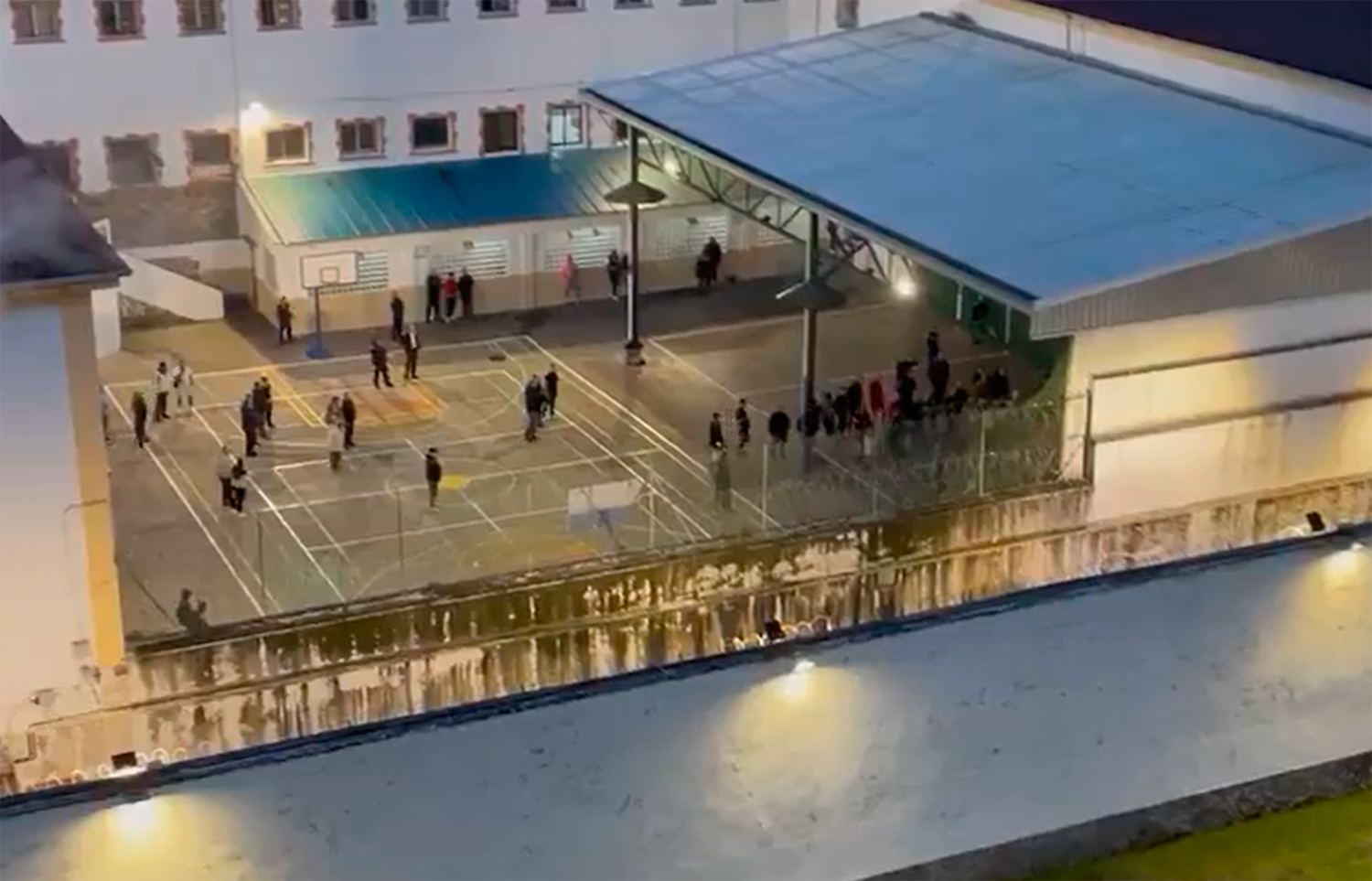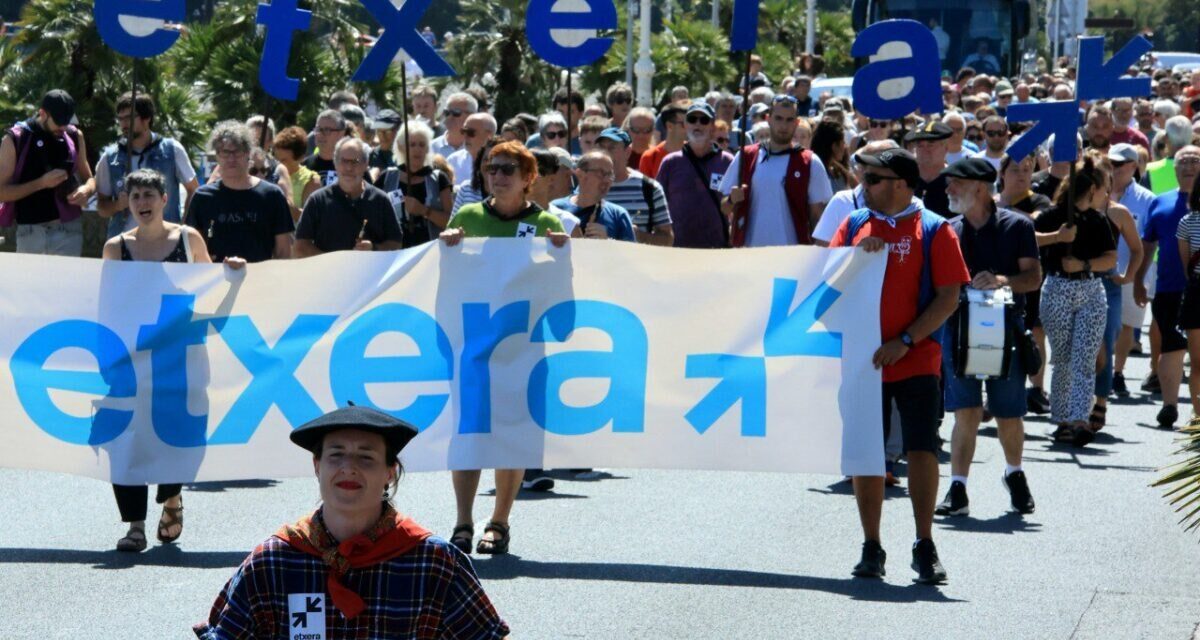As soon as dispersion is over, permit lockdown arrives.
- It is one of the most painful episodes of the Basque conflict in the last 60 years. During this time, over 5,000 prisoners have been in Spanish and French prisons. Today, they do not reach 200, and most are in or near Euskal Herria prisons. The Basque society has demanded in a thousand ways the end of dispersion and, although it is hard to believe, this chapter closes. And now what? In the following lines we have tried to explain the future picture.

The places include those “564 empty beds” that the musical group Hertzainak mentioned in 1991. There were many, certainly, but the summit of the number of prisoners came much later: In 2008 there were 762 prisoners, according to data from Etxerat and EPPK, and in the last four decades the majority hundreds of kilometers from their homes. Most of them have been imprisoned by ETA, or convicted of their actions, but dozens have also been imprisoned by the doctrine “everything is ETA” launched by Judge Baltasar Garzón in the early 2000s.
Currently, some 190 prisoners, 180 of the Basque Political Prisoners Collective, organized around six around the Tinko anti-repressive movement, and the rest of the prisoners and prisoners who follow their way outside the EPPK. 134 are in the prisons of Euskal Herria, 31 in those around Spain and 16 in France, 14 in Euskal Herria, and two at a distance. It should also be noted that Jon Parot and Jakes Esnal have just left prison in France after 32 years in prison. Moreover, outside or inside the group, they try to maintain a normal relationship between prisoners, “and we get it too often,” says Antón, prisoners who are free a few months ago. The name of our witness is not real and at this very special moment he wanted to remain anonymous.
The beginning of the
dispersion after the 1977 amnesty, the Spanish State had in 1978 Basque prisoners in four prisons: In Soria, Madrid, Herrera de la Mancha (Ciudad Real) and Puerto de Santa María (Cádiz), and since 1987 they were distributed throughout the state. This last year is considered the beginning of dispersion. Some 100 prisoners were also held in the French State, distributed in eleven prisons.
In the process of ending the dispersion, 2018 is a significant date, as the president of the Spanish Government, Pedro Sánchez, then announced that the Basque prisoners would gradually begin to approach. ETA also announced its dissolution in May 2018. In 2019 there were significant movements, but then came the pandemic and everything stopped until the end of 2020. The most significant movements occur from 2021 onwards. The Spanish penitentiary institutions announced, almost every Friday, the repatriation or approach to the Basque Country of a group.
In January 2020 Pedro Sánchez was once again elected president of the Government of Spain, with the support of Podemos and other peripheral aspects of the state, including EH Bildu. In the investiture session, Sánchez imposed himself on the right by two votes, and the abstention of the five members of the Abertzale coalition was fundamental to choosing the leader of the PSOE as head of government. In negotiating these abstentions, the commitment to channel the issue of prisoners was key to getting closer to the current situation.
.jpg)
During this year, the Government has given the third grade to 457 prisoners, 25 of them political prisoners, as the best system of social integration.
On October 8, the festival has not yet finished the policy of Alexandria in
San Sebastian, but it is seen on the horizon, and proof of this is the great music festival organized by Sarek on October 8 in Illumbe, in Donostia, to end the dynamic Izan Bidea. The association for the rights of prisoners thus summarizes its intention on its website: “In addition to putting an end to this challenge on 8 October, we would like to join all the citizens who for many years have committed themselves to the end of the policy of remoteness, in order to thank and claim that this achievement, which is of all kinds, is embodied in the end of this policy.”
The end of the dispersion will benefit the whole of Basque society, but above all the prisoners most affected and their families. And especially to the latter, because their relatives have had to travel millions of kilometres in difficult and indescribable situations, but also to the prisoners, even if they have not travelled the kilometres of their relatives, because their red experiences have always felt in their skin.
Alaitz Aramendi is now in Zaballa. He spent thirteen years in French jails, after about a year in Ávila, and is currently in Álava. José Angel Aramendi, his father, is 53 kilometres from Orozko to prison to see his daughter who used to be 1,000-2,000 in Paris, Poitiers, Lille, Rouen or Rennes. “Change is tremendous, it has nothing to do with it, now we have another peace of mind,” says José Luis calmly. “However, it’s not just with us. I once found myself in Estremera (Madrid) with the father of a social prisoner in Málaga, who also told me about his disabilities. The difference is that we are organized and publicized. They don’t.” The Aramendi have also been very lucky with the safety net: “About 90 people have targeted visits between family and friends.” The broad environment of the majority of prisoners has been fundamental in the dispersal, but in some cases the usual visitors could count on the fingers of one hand, a lack that has been greatly suffered by several prisoners and relatives.
.jpg)
The blocking of permits is very important in the ordinary life of the Prison depending on the degree to which the inmate is classified, as depending on this he will have more or less prison benefits and, therefore, more or quieter living conditions. Prison has been a new framework for fighting the Basque conflict for decades, which has not facilitated the lives of prisoners. Almost all Basque prisoners have been in first grade all these years, in the toughest classification. It applies to the most dangerous prisoners, which means, among other things, that they have only two hours of yard a day. However, most prisoners in a penitentiary center are in a second grade, which opens the doors of many activities, and most importantly, of the permits to go out to the street: one day, two, three, four... As agreed by the Prison Treatment Board.
Since ETA ended armed activity in 2011, EPPK has also acted differently and has generally accepted recognition of the pain caused and the individual path. That is, they decide the way collectively, but their execution must be carried out by each prisoner. The end of the dispersion and the changes of degree began at the same time, much progress has been made in the dispersion, also in the change of degree, but not in the consequences that this may entail. Every step is expensive. There were many requests to move from first grade to second grade until 2018, but most refused on the grounds that the inmate was not willing to make ordinary life in prison. The procedure is usually as follows: first apply article 100.2, to alleviate living conditions, then give the second grade and then a penitentiary approach. Before, many prisoners have travelled this route, the best known is the Langraitz road, but leaving the EPPK lines with the rejection of the political Abertzale left, and in many cases with strong discrimination in this social field.
The prisoner Xabier Sagardoi, convicted of being a young Segi, went to the streets with three days of leave in April 2018. In an interview with Gara he commented: “There was little left for me and it gave me vertigo, but I saw that for those who still lack much it was very important to take that step. It was only three days, but it was to make a hole in the wall.” Since then, several prisoners have been released with permits, but, in general, the National High Court of Prison Supervision has blocked this possibility and has appealed 120 permits granted by the prison treatment boards to prisoners, thereby hampering exits. Previously, there was a blockade of going from the first to the second degree to obtain the permits and the third degree.
Being in second grade, access to permits mainly requires four requirements. Lack of parts, warnings and sanctions, enforce half the sanction and present a life project. Basically, the National Court now reiterates the arguments of going from the first to the second grade to deny the permits: that the prisoner does not feel what he really says about the victims and their pain, that he does not ask for forgiveness or, among others, uses arguments written automatically and that he is basically not willing to live in average freedom.
.jpg)
Third Degree Difficulties After the leave,
any prisoner has the goal of the third degree: to go to the street from Monday to Thursday from 7:00 to 23:00 hours and spend Friday, Saturday and Sunday on the street. That is how 28 political prisoners are now. However, this is not an easy road, as twelve third-degree prisoners have been used this year: Joseba Erostarbe, Unai Fano, Iñigo Gutierrez, Jon Crespo, Iñaki Bilbao, Gorka Martínez, Zigor Orbe, Lierni Armendariz, Aitor Herrera and Carlos Subijana, among others, have received the third grade this year, but the prosecutor has turned and now has to decide what to do the national audience. After six months or a year in third grade, it is normal for him to be released on parole.
In cases of exit and third grade leave appeals, the National Court is defending the prosecution and the prisoners. Only in these cases can an appeal be lodged with the Constitutional Court, and although a number of cases have been brought so far, this Court has not dealt with it. These locks are currently working in the National Hearing, but it is to be assumed that the doors of permits and third degree will be opened before afternoon.
In September last year the Basque Government acquired prison powers, which also benefited Basque political prisoners. According to data from the Justice Department last week, 457 prisoners, 25 of them political prisoners, have been given the third grade this year as the best system for social inclusion, as is also being demonstrated in Europe. The Justice Minister, Beatriz Artolazabal, made a clear statement on the anniversary of competition, noting that the Government is not going to make any distinction between prisoners, either for their benefit or for their detriment, and that they will continue to rely on what is decided by the treatment boards of the prisons that work daily with prisoners. In general, the Basque Left is satisfied with the action of the Basque Government since the assumption of powers.
Law 7/2003, the main knot ETA
broke the truce of Estella-Garazi in 2000 and the conflict became full. The socio-political realm of the Abertzale left began to hit the state with the doctrine “everything is ETA” and, to further tighten the penitentiary world, launched Law 7/2003: the years of maximum prison sentence passed from 30 to 40 years and, in addition, the prisoners condemned after this law would not have prison benefits. Or rather, in theory yes, but in practice not. Before this law, the benefits began to be counted against the maximum 30 years, but from now on the computation would not start from the age of 40, but from the entire sanction received. In other words, Basque prisoners with a maximum sentence of 40 years have sentences of many more years, so in practice it is no good for them to benefit. For example, a 100 year-old prisoner must be 50 years old to start receiving any leave.
According to the mediate authorship, the authorship of a murder is not only of the person who executed the action, but also of the chiefs who sent it and controlled it.
This law is now the main point of dismissal for all Basque prisoners, and that is why it requires their removal from the legal and political environment of prisoners, or their reinterpretation, which is also very frequent in the world of laws, their adaptation to new realities. In addition, the judge examining the benefits can compute years from 30 or 40 years.
ETA abandoned armed activity eleven years ago and dissolved in 2018. The Abertzale Left has made a rigorous criticism of the past, even stating that the armed struggle “had never to happen” and, among other things, prisoners are not welcomed publicly. However, in the Spanish State there are those who think that with Basque prisoners you can still follow the policies of revenge and blackmail, and therefore propose measures to tighten the screw.
.jpg)
And more risks According to the legal activity that has been seen in
recent months, there is another great risk that can lead to more prisoners: A legal strategy that is processing the Dignity and Justice (DyJ) victim association to prosecute ETA leaders, high and middle class, to punish some 300 ETA murders that have not been tried. For this purpose, DyJk uses the legal concept of “author mediate”, also known on the street as “intellectual authority”, and according to this reading it is believed that the authorship of a murder is not only of the person who executed the action, but also of the chiefs who sent it and controlled it.
One of them is the murder of Miguel Ángel Blanco (1997). In the opinion of DyJ, who at that time were nine people in the head of ETA, has already filed complaints against them and has been approved by the examining magistrate Manuel García-Castejón de la Público. That is why last July Marisol Iparragirre, Mikel Albisu, Josetxo Arizkuren and Iñaki Gracia were summoned to testify. According to these motives, Blanco not only killed those who shot, but they are also guilty because they completely controlled their activity and could order them not to kill, because they did not.
The Prosecutor's Office against DyJ
For the moment is that of Blanco the first case of this new form and Albisu and Iparragirre, the last telematically, declared before the judge in Madrid. In Arizku, presided over in France and not subject to a statement, Iñaki Gracia was excluded from this case for being prescribed in his case. However, according to prosecutor Pedro Rubira, who was in the statement, DyJ's complaint in this case cannot be allowed, in addition to Gracia, because in the case of the other defendants this question is prescribed.
However, DyJ considers that it is not prescribed because it is not yet 20 years since Albisu and Iparragirre were arrested in 2004 (the crimes are prescribed in Spain at the age of 20). According to Rubia, the prescription would start from 1997, from the moment the facts occurred. Also in this opinion are Jesús Alonso, chief prosecutor of the National Court, and Alvaro García, recently appointed Attorney General of the State. Also the Supreme Court and the jurisprudence of the Constitutional Court.
The issue of mediate authorship has more scope, according to the jurisprudence of the Spanish State, because it is necessary to demonstrate the concrete relations between leaders and authors in each crime, and because so far no ETA leader has been punished in this way. That is, only by leading can they not be accused of all crimes that occurred during the head.
There are more difficulties in this path of mediate authorship. In fact, DyJ bases this programme on international law, within crimes against humanity, and Spain introduced this type of crime into its Penal Code in 2004. Therefore, only this type of crime could be tried in Spain in the events that occurred after that date.
According to Spanish jurisprudence, relations between leaders and authors must be demonstrated in each crime and ETA leader has never been punished in this form of DyJ
This is not
the case of Miguel Ángel Blanco, nor another that has now been seen on 3 October. This year marks the 20th anniversary of the ETA attack on the Civil Guard in Santa Polo (Alikante, Catalan Countries), with two deaths, one man and one girl. The case is tried and two people are condemned for it, but on 3 October they have called six people investigating: Jon Olarra, Ainhoa Mugika, Iñaki Esparza, Mikel Albisu, Marisol Iparragirre and Ramón Sagarzazu. And many other kinds of lawsuits have already been filed by DyJ. According to attorney Amaia Izko, “198 dead and unprescribed attacks remain to be clarified, and if these claims continue, dozens of people can go to jail.” When the conflict is closing the chapter of dispersion and despite the difficulties, when other doors are being opened.
While in 2013 the European Council on Human Rights was resolving with the Parot doctrine, the Spanish Minister of the Interior, Jorge Fernández Díaz, clearly stated that if rejected, the Spanish authorities had spaces for “legal engineering”. It would not be the first time that Spain would practice legal engineering, “everything is ETA”, the cases of the late Iñaki de Juana and Antton Troitiño, the penitentiary legislation... and seeing what we are explaining, not the last. In the month of July, in the case of Blanco, the prosecution and the defense agreed in the assessment of the suit, and yet, despite the attitude shown by the prosecutor’s office in the future, it is almost certain that these cases will come to the trial because DyJ is being filed as a private indictment and thus it is possible to reach the oral question, even if the prosecutor’s office is against the complaint.
“Condemned to Hope” Bilbaíno Amaiur
Iragi is 19 years old, studying in Vitoria and has never seen Harriet Iragi his father on the street. He is 46 years old and has 22 prisoners. After a year in Valdemoro, nine in Córdoba and eleven in Castellón, it is located in Álava, 75 minutes from Bilbao. The conference takes place mainly in the penitentiary economy, dedicating free time to theatre, ceramics and sport, among others. “He has many visits – says Amaiur – my mother and I go, the whole family, friends... Yes, my father is still in prison, but the change has been crystal! In the last two years we have had many new experiences and emotions, and somehow we have begun to see the end of the tunnel.”
"The change has been of Christ! In the last two years we have had many new experiences and emotions, and somehow we have begun to see the end of the
tunnel” (Amaiur Iragi, daughter of prisoner
Harriet Iragi)
Antón continues to dance emotions and feelings, as is the case with most of the prisoners just leaving the street. After many years in prison, he is now free and we chat in a chair of the Taconera park of Pamplona, one releasing new sensations and another swallowing.

Many moments of the past months are memorable for Anton, but among them he remembers strongly what the third grade announced: “I am embarrassed, almost not knowing what to do, and his colleagues hugging and cheering enormously. In fact, we prisoners are constantly encouraged to take new steps.” And on the street what? “You’re constantly adapting, but at first it’s very curious, in third grade you have to remind yourself that you’re still in prison. Prison has been our ‘comfort world’, where we feel safe and vulnerable on the street. But from reception and other institutions we are receiving great help. And then there's love, we feel great love in our broad environment, and that helps a lot. For the prisoner, in short, being inside or being just out, the affective world is very important.”
Back home, we passed through the surroundings and passed over the prairie of the old prison in Pamplona. There is no longer a prison there, a decade ago they brought the news outside the ciudad.En San Sebastian is also building the new prison next to the closure of Martutene and the Zubieta incinerator. The site of the former prison is now a park of the Insumission in Pamplona, but it is also next to the Provincial Court of Navarra which sent those who were unwilling to prison. In any case, it can also serve as a way to give a nice tour of the city walls to any former convict who wants to visit the leading Capital.
Jar gaitezen 2025erako proposamen politiko gisa, Espainiako Auzitegi Kolonialaren (AN) epai guztiak berrikusten hasteko eta makila bakoitzak bere belari eusteko.
Unionismoarekin lerrokatutako alderdi, sindikatu eta gizarte-erakunde gehienek, eta ez bakarrik horrela... [+]
Next Saturday, 11 January, the Sare citizens' network called for a new demonstration in Bilbao in defence of the rights of Basque prisoners. This is a unique opportunity to move forward on the path of coexistence in our people, after decades of violent confrontation and, even... [+]
Hatortxu Rock jaialdiko 29. edizioa egingo da larunbatean Atarrabian. Sarrerak jada agortuta daude, baina txandak osatzeko laguntza behar da oraindik.
What surprised you the most when you left jail? I've been asked many times in the last year and a half.
See that the streets of Bilbao are full of tourists and dogs with two legs, for example? Or the changes in the political situation? The first one has tired me and annoyed me... [+]










